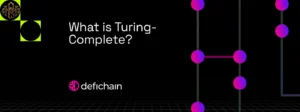
Close


Turing completeness is a concept in computer science that refers to a system’s ability to perform any computation, given enough time and resources. In the context of blockchain, a Turing-complete system can execute complex scripts and smart contracts, enabling the creation of decentralized applications (DApps).
Blockchains like Ethereum are Turing-complete, allowing developers to write smart contracts that can handle complex logic and operations. This capability is essential for creating advanced DApps that go beyond simple transactions and offer a wide range of functionalities.

The primary advantage of Turing completeness in blockchain is its flexibility. Developers can create versatile applications that can automate tasks, manage digital assets, and interact with other smart contracts. This opens up a vast array of use cases, from finance to supply chain management.
However, Turing completeness also introduces risks, such as the potential for bugs and vulnerabilities in smart contracts. Malicious actors can exploit these vulnerabilities, leading to significant financial losses. Thorough testing and auditing are crucial to mitigate these risks and ensure the security of Turing-complete systems.
As blockchain technology evolves, Turing completeness will continue to play a pivotal role in its development. It enables innovation and the creation of sophisticated applications, driving the adoption of blockchain in various industries. Balancing flexibility with security will be key to harnessing its full potential.